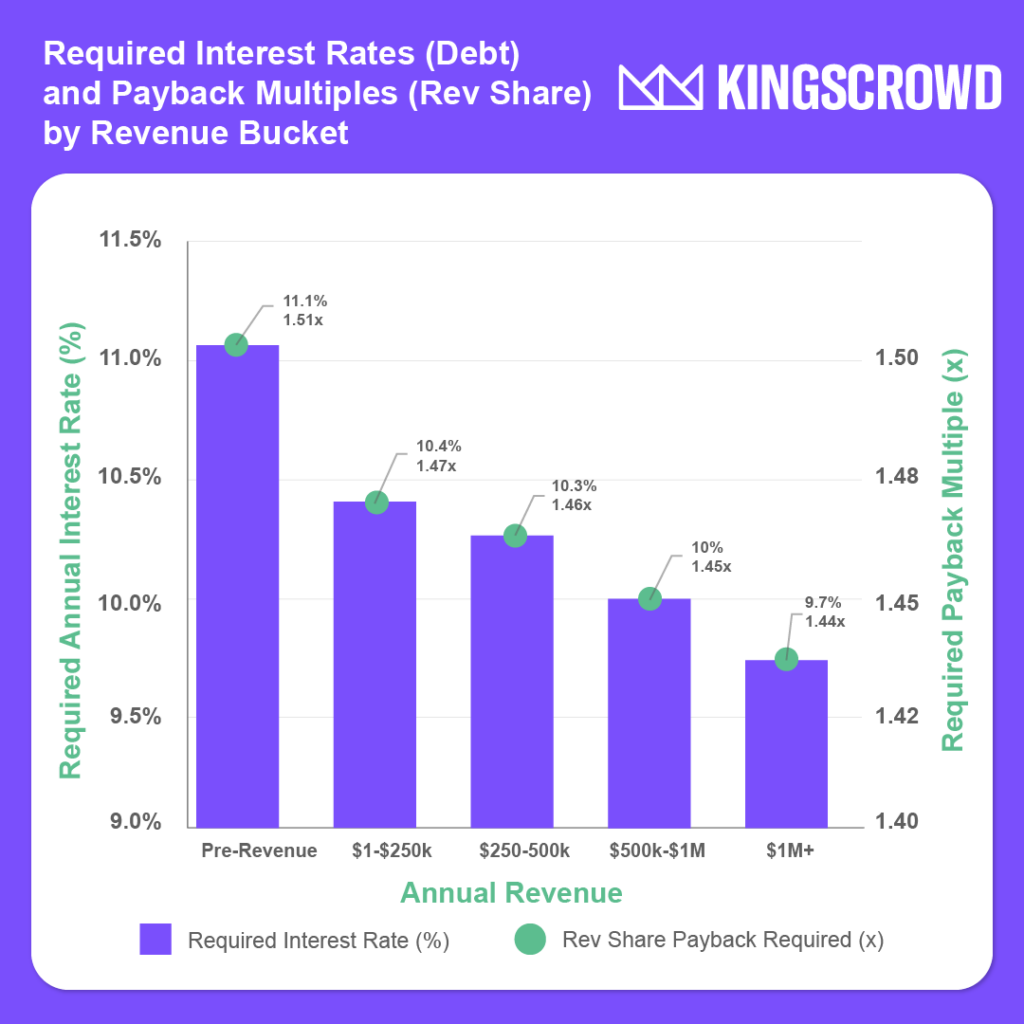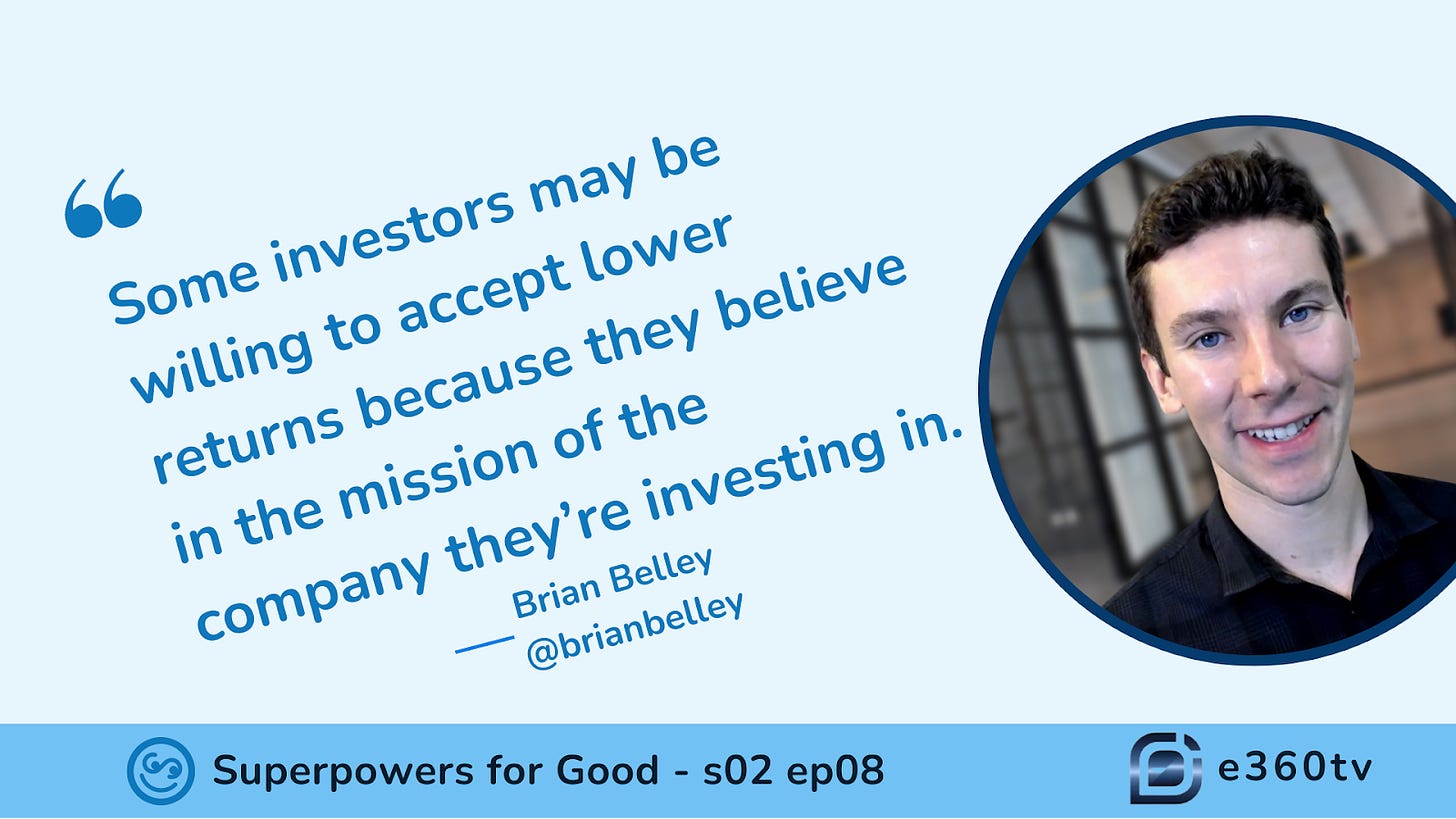Unveiling the Realities of Debt Investing in Crowdfunding: Insights from KingsCrowd’s Brian Belley
I’m not a financial advisor; Superpowers for Good should not be considered investment advice. Seek counsel before making investment decisions.
Watch the show on television by downloading the e360tv channel app to your Roku, AppleTV or AmazonFireTV. You can also see it on YouTube.
When you purchase an item, launch a campaign or create an investment account after clicking a link here, we may earn a fee. Engage to support our work.
tl;dr:
Guest Introduction: The episode features Brian Belley, VP of Product at KingsCrowd, discussing his analysis on rates of return on various debt structures and how investors should evaluate compensation for risk.
Key Analysis: Brian explains that many investors misunderstand the risks involved in debt and revenue share deals in Small Businesses and Crowdfunding. He highlights the necessary interest rates or payback multiples needed to compensate for these risks.
Revenue-Based Financing Explained: Brian delves into the mechanics of revenue-based financing, where investor returns are tied to company revenues, offering flexibility for companies with fluctuating earnings.
Failure Rates and Required Returns: Data shows that pre-revenue companies have a higher failure rate (around 5.5%), requiring higher interest rates to compensate investors. As companies grow in revenue, failure rates decrease, and required interest rates also lower.
Market Trends: The transcript discusses how rising federal interest rates have influenced the interest rates offered by crowdfunding platforms, showing a trend of increasing returns to align with market conditions.
In today’s episode, I had the pleasure of welcoming Brian Belley, Vice President of Product at KingsCrowd, to discuss a profoundly important topic: the risk-return dynamics of debt and revenue share deals in regulated investment crowdfunding. Brian recently published an insightful analysis that sheds light on the realities of these investment vehicles, challenging many common assumptions.
As a quick aside, let me say that I love Investing in crowdfunded debt offerings. Having made dozens of investments in the space, I’m lucky to report that as yet, I haven’t had a borrower default. I was excited to have Brian on the show to help you learn how to better approach investing in regulated investment crowdfunding debt offerings.
When we think about crowdfunding, our minds often gravitate toward high-Growth startups. But there’s another side to this space: debt and revenue share deals. These options may seem less risky compared to startup equity, but as Brian highlighted, that perception can be misleading.
Understanding the Risk of Debt and Revenue Share Deals
Many investors approach these deals with a mindset of minimizing risk, viewing them as safer alternatives to equity investments in startups. Yet, as Brian points out, “What a lot of these investors miss is that there’s still a lot of risk in these deals.” These companies may not aim for venture-backed growth, but they still carry significant risk, especially those that are pre-revenue or early-stage.
Brian’s data-driven analysis provided a comprehensive overview of the failure rates associated with companies offering debt and revenue share deals. He explained that pre-revenue companies carry the highest risk, with an 11% return required to compensate investors for potential failures. For more mature businesses generating $1 million or more in annual revenue, the required interest rate drops to around 9.7%. These numbers serve as a wake-up call to those who assume debt investments are inherently low-risk.
One of the most compelling aspects of our conversation was Brian’s explanation of the importance of compensation for failure risk. He emphasized, “These aren’t necessarily the super high-growth trying to be a venture-backed startup, but there’s still a lot of risk in this.” As investors, we need to account for these risks when evaluating debt and revenue share deals, just as we would with equity investments.
Revenue-Based Financing: A Flexible Option with Risks
In our discussion, Brian took the time to explain how revenue-based financing works, providing valuable insights into the mechanics behind these deals. He described revenue-share deals as having two primary components: the percentage of revenue shared with investors and the payback multiple. He shared a practical example, saying, “Let’s say a restaurant has cyclical revenues. Investors might receive higher returns during busy summer months but less during slower winter months. That flexibility can benefit the business, but it also means the timing of returns is unpredictable for investors.”
While this model offers flexibility, it also introduces a level of uncertainty. Investors may get paid back faster than anticipated if the business performs well, but they could also face delays if revenues fall short. As Brian pointed out, “You’re not going to get consistent month-by-month payments, but if you believe that the company has potential, it can give them more flexibility and potentially work out in your favor.”
This flexibility, however, comes with a tradeoff. Investors must be prepared for variable returns, which may stretch over an extended period. Yet, the potential for higher-than-expected returns if the company succeeds makes revenue-based financing an attractive option for those willing to accept some level of uncertainty.
Failure Rates: A Key Consideration for Investors
One of the most critical factors in evaluating any investment is the potential for failure. Brian’s analysis broke down the failure rates for companies at different stages of revenue generation, with pre-revenue companies exhibiting the highest failure rate at around 5.5%. This failure rate decreases as companies generate more revenue, with those earning over $1 million showing a failure rate of just 1.5%.
However, Brian cautioned that these figures only represent known failures. “Sometimes companies shut down quietly, or it takes months or even years to fully dissolve,” he explained. This means that the actual failure rates could be higher, and investors need to factor in this uncertainty when considering their potential returns.
To compensate for the unknowns, Brian suggests building in a margin for error when calculating required returns. By accounting for potential late payments and unknown failures, investors can better manage their expectations and avoid overestimating their future returns.
The Impact of Market Conditions on Interest Rates
Our conversation then turned to the effect of broader economic trends on the interest rates offered in debt and revenue share deals. During the COVID-19 pandemic, the Federal Reserve dropped interest rates to near zero, but as the Economy began to recover, rates steadily increased. Brian’s analysis showed that the interest rates on debt deals offered through crowdfunding platforms followed a similar trajectory. He observed, “The interest rates offered on deals in mid-2022 were just below 10%, but by July 2024, they had risen to over 12%.”
As the Federal Reserve continues to adjust interest rates, it will be interesting to see how the crowdfunding space adapts. Lower interest rates could make it more challenging for investors to achieve their desired returns, while higher rates may improve the prospects for those looking to lend. Regardless of market conditions, understanding the factors that influence interest rates is critical for making informed investment decisions.
Platform-Specific Trends: Not All Crowdfunding Deals Are Equal
Finally, Brian’s analysis looked at interest rates by platform, revealing that different crowdfunding portals offer varying rates depending on their focus. Platforms like Honeycomb Credit and SMBX, which specialize in debt deals, tend to offer rates in the 8% to 11% range, while some smaller platforms may have higher rates. However, as Brian noted, some of these higher rates may come from platforms that have only done a few deals, making their data less representative.
He also highlighted the role of social mission in crowdfunding, noting that platforms like Climatize and Crowdfund Main Street often support companies with a clear impact focus. “Some investors may be willing to accept lower returns because they believe in the mission of the company they’re investing in,” he explained. For impact-driven investors, this tradeoff between financial return and social benefit is a key consideration.
Conclusion: Balancing Risk and Return in Crowdfunding Investments
Today’s conversation with Brian Belley was eye-opening. His data-driven analysis dispels the myth that debt and revenue share deals are inherently low-risk. As investors, it’s essential to understand the failure rates, interest rate trends, and platform-specific dynamics that can impact our returns. By considering these factors, we can make more informed decisions and better balance risk and return in the growing world of regulated investment crowdfunding.
Brian’s analysis indicates to me that the high interest rates offered on crowdfunding portals like SMBX and Honeycomb Credit are genuinely required to compensate investors for the risk they take. In other words, I conclude that investors should not think of these rates as usurious or penurious but simply as fair.
Brian’s insights remind us that while debt and revenue share deals may offer more predictable returns than startup equity, they still carry risk. As investors, we must approach these opportunities with eyes wide open and be fully aware of the potential pitfalls and rewards. Ultimately, by understanding the data, we can make smarter, more strategic investments in companies that align with our financial goals and values.
Guest Profile
Brian Belley (he/him):
Vice President, Product, Kingscrowd
About Kingscrowd: Kingscrowd is a team of financiers, venture capitalists, technologists, founders, and experts on a mission to democratize private market investing. Our mission is to educate and empower everyday investors with the same level of access to private investment opportunities and diligence as institutional investors.
Kingscrowd collects data — over 300 data points — on every online capital raise being conducted under Regulated Investment Crowdfunding (Reg CF and Reg A+). Our platform allows investors and founders to make more informed investment and capital-raising decisions. In addition, Kingscrowd operates the online private market’s first data-driven investment fund, Kingscrowd Capital.
Website: kingscrowd.com
X/Twitter Handle: @kingscrowdinc
Biographical Information: Brian Belley is an aerospace engineer and Fortune 500 engineering lead turned tech entrepreneur with a keen eye for innovative financing in the startup ecosystem.
After a decade in the defense industry working on electronic warfare Technology to protect our country, he jumped into the alternative Finance space full-time as the founder of Crowdwise. Acquired by KingsCrowd in 2021, Brian now serves as KingsCrowd’s Head of Product. With over 220 personal angel investments under his belt, he’s deeply entrenched in the investment landscape, offering invaluable insights to both startups and investors.
Always at the forefront of alternative investing – such as mining Bitcoin in his garage back in 2013 to crowd-sourced Real Estate and peer-to-peer lending, NFTs and art – he’s no stranger to seeking diversification and alpha through areas that mainstream investors haven’t yet discovered.
Beyond his executive and entrepreneurial roles, Brian is an active board member for the Crowdfunding Professional Association (CfPA) and a passionate advocate for growth and Innovation in the online alternative investing industry. He is also a Board Member of New England FIRST, a STEM youth organization helping to introduce the future leaders and entrepreneurs to STEM fields.
In his free time, Brian is an avid runner and also dabbles in numerous side projects to stay technically sharp; one of which led to his sending weather balloons to near-space that were featured on a skit for The Late Show with Stephen Colbert.
X/Twitter Handle: @brianbelley
Personal Facebook Profile: https://www.facebook.com/brianjbelley
Linkedin: linkedin.com/in/brianbelley/
Max-Impact Members
The following Max-Impact Members provide valuable financial support to keep us operating:
Carol Fineagan, Independent Consultant | Lory Moore, Lory Moore Law | Marcia Brinton, High Desert Gear | Ralf Mandt, Next Pitch | Sheryle Gilihan, CauseLabs | Add Your Name Here
Upcoming SuperCrowd Event Calendar
If a location is not noted, the events below are virtual.
Impact Cherub Club Meeting hosted by The Super Crowd, Inc., a public benefit corporation, on September 17, 2024, at 1:00 PM Eastern. Each month, the Club meets to review new offerings for investment consideration and to conduct due diligence on previously screened deals. To join the Impact Cherub Club, become an Impact Member of the SuperCrowd.
SuperCrowdHour, September 18, 2024, at 1:00 PM Eastern. Each month, we host a value-laden webinar for aspiring impact investors or social entrepreneurs. At September’s webinar, Devin Thorpe will provide an in-depth answer to the question, “Can I Beat the Stock Market with Impact Crowdfund Investments?” Free to attend.
Superpowers for Good Live Pitch, September 25, 2024. The application window is open now. Apply today! The Live Pitch will stream simultaneously to the e360tv network, Facebook, Linkedin, YouTube and Superpowers for Good. We hope for an audience of thousands! Don’t miss this opportunity to pitch your regulated investment crowdfunding campaign to the SuperCrowd!
Recently, we created an AI GPT to help you learn more about The Super Crowd, Inc., a public benefit corporation, and our upcoming events. Click here to try it.
Community Event Calendar
Successful Funding with Karl Dakin, Tuesdays at 10:00 AM ET – Click on Events
Main Street Skowhegan and NC3 Entrepreneur Finance Workshop Series, September 17 – November 19, 2023.
Crowdfunding Professional Association, Summit in DC, October 22-23
If you would like to submit an event for us to share with the 8,000+ members of the SuperCrowd, click here.
We use AI to help us write compelling recaps of each episode.






























